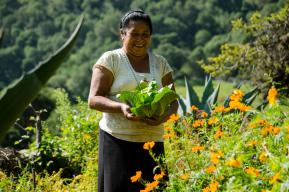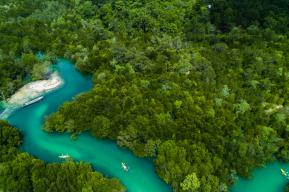News
Biosphere reserve managers and experts to lead actions towards more sustainable mountain regions

Fragile mountain ecosystems and the wealth of services they provide are highly threatened by climate change. Mountain regions regulate climate, air quality and water flows, and contribute to protecting local communities against natural hazards, among many other services. They are home to approximately 15% of the world’s population and are a source of water for larger communities downstream. Managing such regions sustainably is particularly challenging. The World Network of Mountain Biosphere Reserves was recently created to allow local managers of mountain regions to share good practices, develop solutions and benefit from expertise, drawing from experiences all around the world.
Members of the network and specialists came together for a workshop organized by the UNESCO Man and the Biosphere Programme (MAB) and the Ordesa-Viñamala Biosphere Reserve in Torla, Spain, on 18 and 19 April 2022, to prioritize the main work themes of the World Network of Mountain Biosphere Reserves, taking into consideration that mountain biosphere reserves are rich in culture, biodiversity, endemism and multiple ecosystem services.
The participants also addressed the challenges faced by mountain biosphere reserves in the face of climate change, the impact on their ecosystems, and how these changes affect socio-economic activities and dynamics in mountain areas and their areas of influence.
In this regard, the main issues identified during the workshop were isolation, lack of basic infrastructure, depopulation, and poverty – particularly faced by some countries.
The participants highlighted the importance of investing in the development of new technologies that can support sustainable management, productive activities and tourism, as well as the adaptation and mitigation of climate change impacts.
Emphasis was also placed on the importance collaborating with universities and research centres, with a view to generating a "dialogue of knowledge" between the scientific community and local knowledge, as a fundamental axis for a better understanding and management of biosphere reserves.
Regarding management issues, the participants identified a need for a legal structure for biosphere reserves, which would ensure autonomy and flexibility in their management. It was concluded that political support at different levels (national, regional and local) is fundamental to gain institutional support and raise sufficient funds for their basic functioning.
The importance of participation and cooperation between the different public and private actors was also highlighted as a key element for the proper functioning of a biosphere reserve. There is an imperative need to develop guidelines for working with the private sector, especially with extractive and energy companies that could give rise to contention, and with private companies that are beneficiaries of ecosystem services derived from the conservation and sustainable use of these biosphere reserves.
To promote the financial sustainability of mountain biosphere reserves, technical support should be given appropriate project funding and complemented with public-private partnerships.
During the workshop, successful cases of public-private partnerships in Spanish biosphere reserves were presented, including funding tools from the Organismo Autónomo Parques Nacionales de España (OAPN), municipalities and autonomous regions, European funds and private companies, such as Volkswagen, Naturgy and Iberdrola.
Finally, the process of creating a biosphere reserve in the metropolitan area of Santiago de Chile was presented to showcase how a mountain biosphere reserve can present an opportunity for tourism and with a view to achieving sustainable development in the region, highlighting the importance of this type of ecosystem.
The workshop was attended by managers of the Ordino Biosphere Reserve in Andorra; several Spanish biosphere reserves, including Valles de Omaña y Luna, Ordesa-Viñamala, Valles de Leza, Jubera, Cidacos and Alhama; the UNESCO-MAB focal points of Chile (Corporación Nacional Forestal) and Spain (Organismo Autónomo Parques Nacionales de España - OAPN); representatives of the Mountain Adventure and Nature Tourism programme; representatives of the Regional Strategic Programme for "Santiago, Capital of Mountain Tourism" of the Chilean Production Development Corporation; representatives of Naturgy and Iberdrola; as well as representatives of the Mountain Partnership Secretariat and the Secretariat of the MAB programme.
The first virtual meeting of the World Network of Mountain Biosphere Reserves will take place on 12 May 2022 at 13.00 (CEST).
To participate in the meeting, please register before 10 May.











